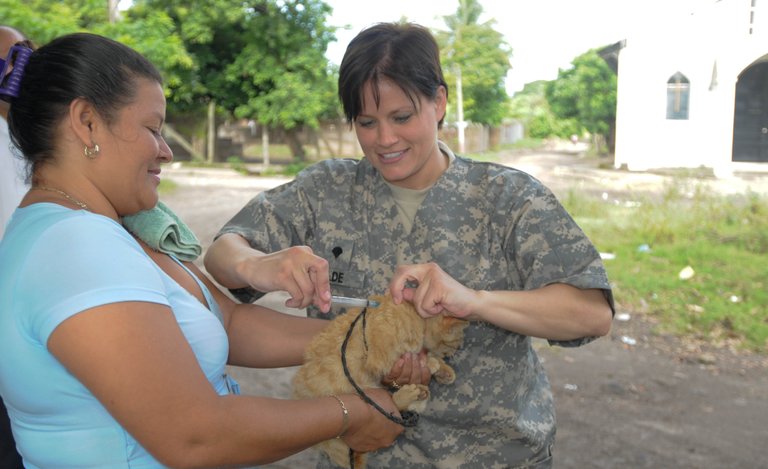Most times when I share my knowledge about certain infections/diseases, I always clamor for us to get our pets vaccinated, some people understand what I mean by that, but maybe some people are out there who would still take the issue of vaccination with levity, and that's the reason why I have dedicated this post to write on vaccination in itself and the importance of getting our pets to do it right.
Animal vaccination is beyond a routine check, it is rather a very important step to ensure the health of your pet. Vaccination does a lot of good, not only does it prevent widely spread deadly diseases, it promotes community health too, and generally ensures wellness in our pets.

upload.wikimedia.org
When our pets are properly vaccinated, they are protected to a great extent against existing forms of suffering, they also help to reduce the risk of spreading the infection to other pets and humans alike.
There are diseases that animals would get and it would create serious consequences for them, physically and health-wise, we have examples in the form of parvovirus, leukemia, and lots more. When animals have these diseases, they get severe consequences like discomfort, pain, and sometimes even permanent damage to their health. The presence of vaccination would limit significantly the occurrence of illnesses amongst the population of animals.
What vaccination does is stimulate the immune system of the animal to produce the antibodies that can fight off the specific disease for which it was taken. When an animal is vaccinated, they are protected against sickness even if they come in contact with the said disease in the future.

Pexels.com
The vaccine contains a small amount of weakened or killed forms of the disease, this way the animal's immune system recognizes and remembers it. Vaccines are of three types, and all of them contain antigens.
Killed vaccines consist of dead microorganisms mixed with adjuvants.
Component Vaccines contain adjuvants that would help increase immune response.
Modified live Vaccines contain viral particles rendered harmless but contain sufficient fragments of the original pathogen to stimulate the immune system.
As animals differ in species, age, and geographical locations, they differ in their vaccination requirements, this means you would need to work with a good veterinarian to know which one is good for your pet as well as the time required to get them.
In the case of vaccinating your pet, there are factors to consider, and the first is what I have mentioned above, looking for a good and certified veterinarian, you can find them in a good clinic. Once you find a good and well-managed clinic, you will be sure to find good veterinarians there.
In addition to finding a good clinic, you also must look out for the services rendered there, are they only into rehoming and preventive care, or do they offer emergency services as well, this would help you know the type of case to take there.
Vaccination is great, but it comes with possible side effects that pet owners must be aware of, mild fever, soreness at the sight of injection, and lethargy are possible side effects to be aware of. Pet owners must watch out for signs of adverse reactions and report instantly to the vet clinic.
